Born on 15th October 1844, German philosopher Friedrich Nietzsche is known for his intellect, and he isn’t for the faint-hearted. All life lessons from Nietzsche delve into the human condition as is, without any filter or sugarcoating. To read him is to encounter a mind that isn’t afraid of contradiction. He is someone who can make you wonder about the darkest corners of human existence while confronting the core of your existence. If this sounds too deep, then wait till you read Nietzsche’s book quotes on life and death.
Friedrich Nietzsche speaks to the parts of us that are exhausted by pretending, to the parts that crave a bit of comprehension, and to the parts that feel suffocated. These 13 quotes of Nietzsche on life, struggle, and strength are invitations for you to live more freely, honestly, and deeply. Scroll down and thank us later:
1. God is dead and we have killed him
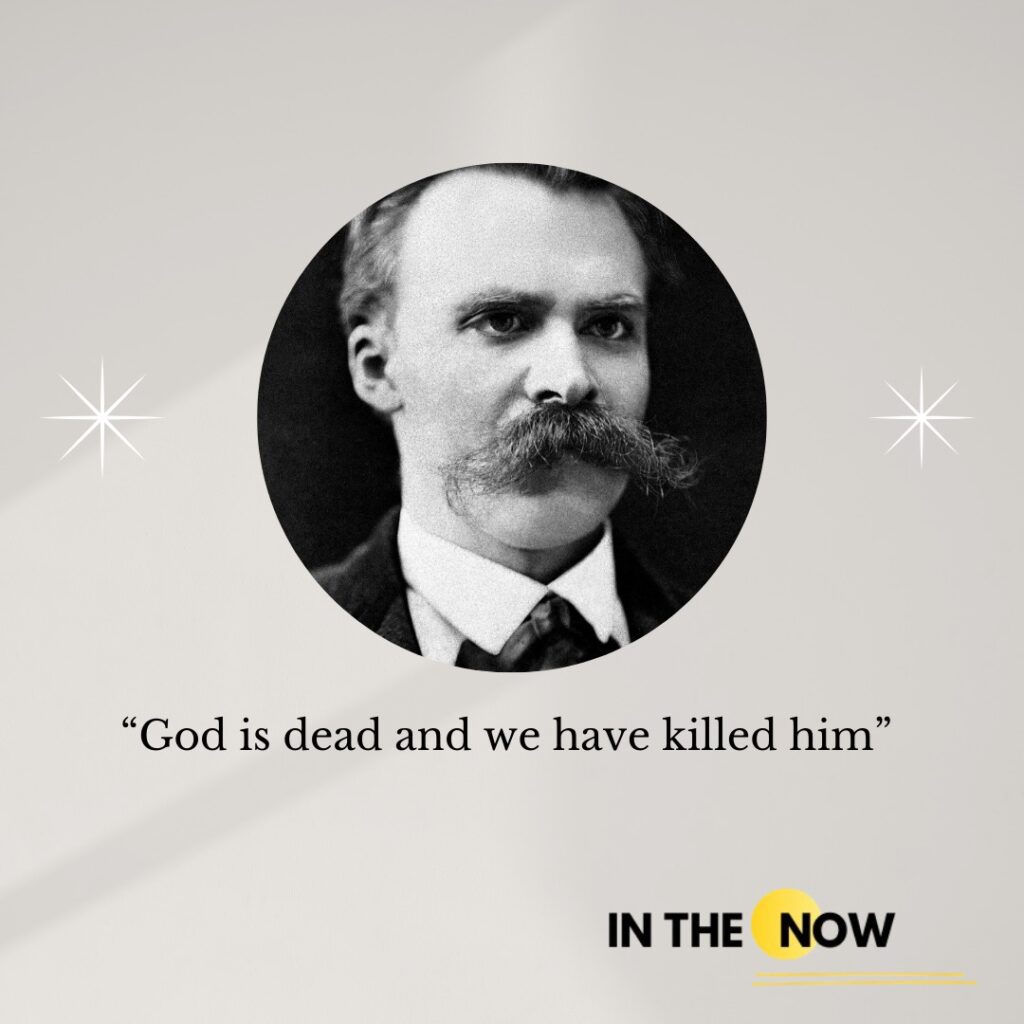
First mentioned in his book, The Gay Science, and later echoed in Thus Spoke Zarathustra, this is perhaps the most famous Nietzsche quote that has been misunderstood by many. Even though his nihilism is transparent here, he is not literally claiming the death of a certain God. Nietzsche observed a decline in people’s faith in Christianity. That’s the reason behind this statement.
“We have killed him” refers to humanity’s responsibility in abandoning Jesus’ teachings and beliefs through rational inquiry and skepticism. Furthermore, he stresses that the death of God has created more chaos than ever. Without God, there is no fear of wrongdoing. There is no purpose of morality, kindness, or gentleness. Nietzsche teaches us that we need God to have order in society.
2. To live is to suffer, to survive is to find some meaning in the suffering
How to live according to Nietzsche? Accept that suffering is an inevitable part of human existence. None of us can escape it. Unlike Buddhist philosophers who try to avoid suffering, Nietzsche sees it as something that’s essential for a human being to survive.
In simple words, according to Nietzsche, life is meaningless without suffering. Even love is meaningless without your lover making you feel miserable.
Be it physical, emotional, psychological, or existential, Nietzsche doesn’t want us to view pain in a negative light. He believes that the act of surviving suffering with dignity, and more importantly, finding or creating meaning in it, is what gives life value and strength. Thus, the meaning of life is suffering and this one philosophy of his has influenced those that came after him.
3. Is man one of God’s blunders or is God one of man’s blunders?
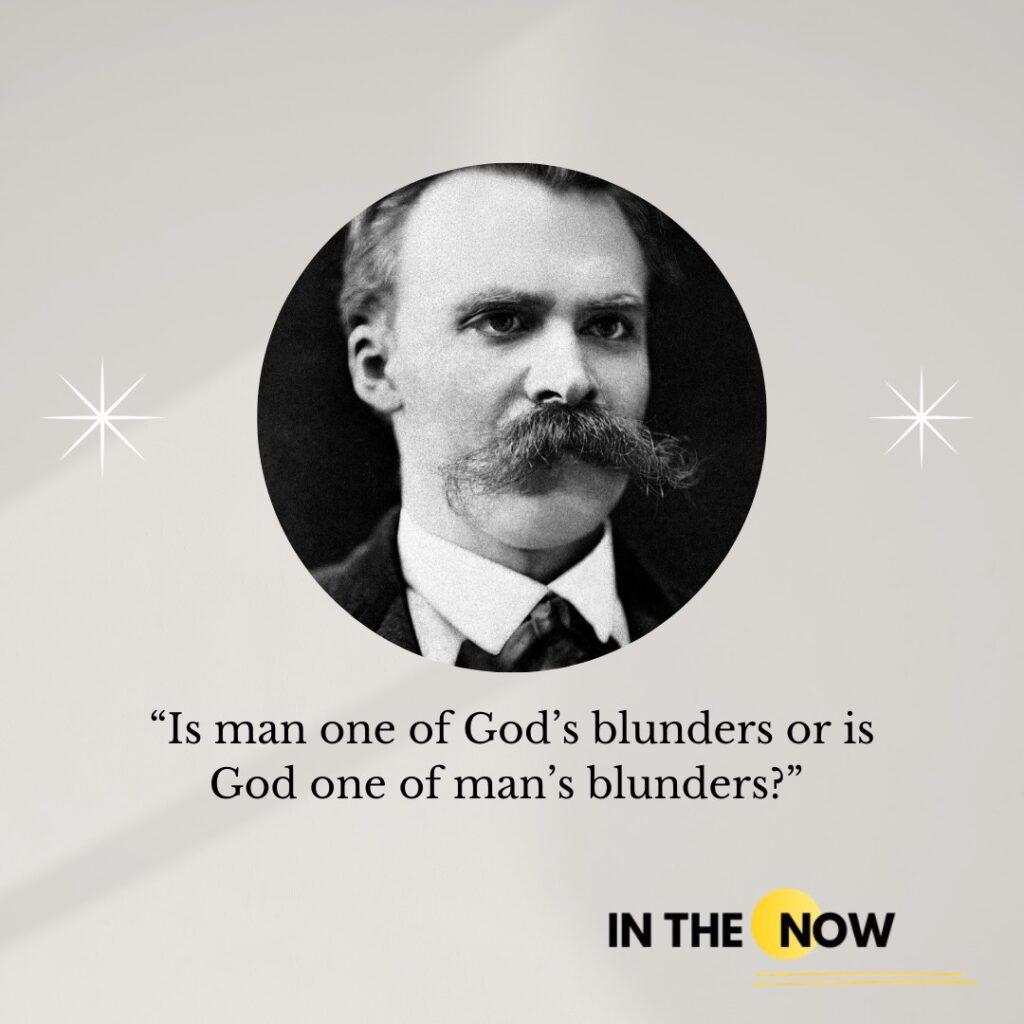
Nietzsche was a self-professed nihilist (someone who thinks life is meaningless and doesn’t believe in God) and this rhetorical question is proof of his critique of religion. It is sort of an interesting paradox when you think about it. Nietzsche questions the logic of a perfect creator making an imperfect, suffering creature.
The first half of the quote: if God is all-powerful and all-good, why would His creation be so flawed, sinful, so prone to error, cruelty, and confusion? This exposes contradictions in theological explanations of evil and suffering.
Nietzsche’s next question of God being a blunder made by humans exposes humans and their desperate need to find comfort in a chaotic world. However, it backfired, and this invention became oppressive. Now, that’s one among the dark quotes you need to ponder upon. Are we just misguided? Maybe. Maybe not.
4. The snake which cannot cast its skin has to die. As well the minds which are prevented from changing their opinions; they cease to be mind
Nietzsche’s On the Use and Abuse of History for Life gives one of the main rules of life: that life isn’t static. It is dynamic. To elaborate, life is defined by constant change, and those who cannot adapt, be it physically, morally, or intellectually, will stagnate and wither. They won’t grow in life. This is something I personally relate with. I realized that my biggest growth came when I stepped outside my comfort zone. Holding onto the past held me back, but change has always pushed me forward.
Just as a snake must shed its old skin to grow, a human being must be willing to let go of their outdated beliefs, rigid ideologies, and fixed identities in order to thrive. This is one among Nietzsche’s main beliefs that if you don’t risk transformation, you will end up becoming a robotic person. Make this your purpose of life. Start by transforming your thoughts, values, and your being if you want to flourish in life.
5. And those who were seen dancing were thought to be insane…
In life, not everyone will understand your path or the passions that drive you. Some will judge from the sidelines, blind to the purpose behind your actions. That’s what Friedrich Nietzsche’s quote means. “And those who were seen dancing were thought to be insane by those who could not hear the music.” Ever met someone who always critiqued your work and never supported you? That’s because they don’t understand the value or joy that doing something meaningful brings in life.
For example, Van Gogh’s paintings were considered too bright by his contemporaries. Today, he is more famous than others because they couldn’t hear the music he was dancing to. Nietzsche’s moral theory about enjoying life is all about a person following their own rhythm, defying the herd mentality.
6. That which does not kill us makes us stronger
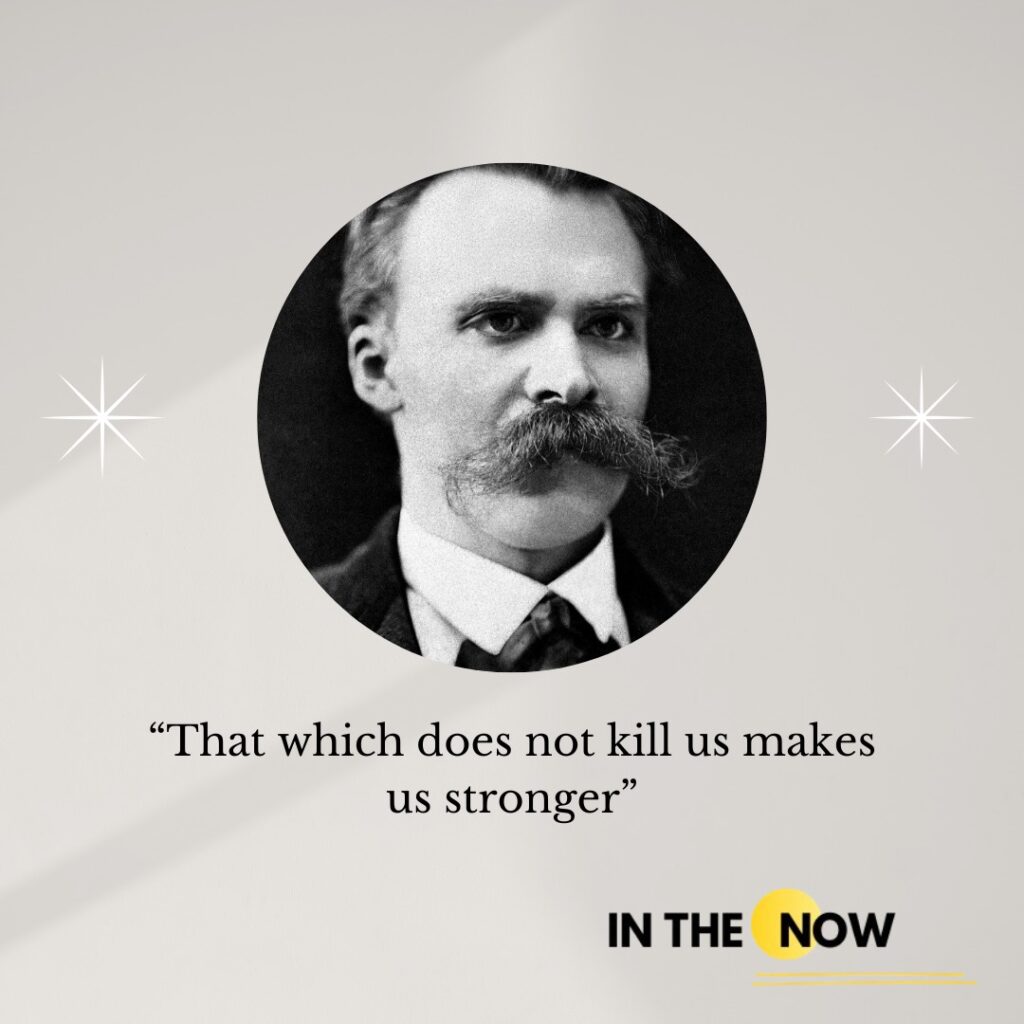
Written in Twilight of the Idols, Nietzsche’s fierce critique of traditional values, religion, and philosophy, this is yet another one of Nietzsche’s widely quoted aphorisms. Your life story is all about the things that didn’t kill you but made you a stronger, more resilient person. Life is a constant struggle, and we need to develop strength to face all the challenges.
You are dead if you run away from it, but if you embrace difficulties, you become stronger. So, if you are struggling with hardships, Nietzsche’s outlook on life can be a tool for empowerment, transformation, and ultimately, greatness, as he urges us to rise above mediocrity and achieve our true potential.
7. The essence of all beautiful art, all great art, is gratitude
Sometimes we struggle to understand the purpose behind our art, like literature, music, and other forms of creative expression. Of course, we love it, show it off, and receive appreciation from others. But is art stemming from your creativity alone? No. It comes from gratitude.
By gratitude, Nietzsche doesn’t just mean being polite or thankful. He wants us to be appreciative of the opportunities we get as artists. True art is born when a person can take all of life, both the joy and the suffering, the chaos and the order, and be grateful for it.
8. The secret to harvesting the greatest fruitfulness and the greatest enjoyment from existence is to live dangerously!
Nietzsche thinks self-limitation is a weakness in humans. Why would you want to live comfortably when you can live dangerously? Sounds scary, but he has a point. For instance, are you stuck in your 9-to-5 job because you need to make ends meet, even though what you truly want is to quit and become an actor?
Nietzsche challenges us to reject the easy life and pursue one that demands authenticity and risk because that’s where true growth lies. So, go ahead. Be courageous and live dangerously, because there is no point in living a mediocre life, or worse, living a life you don’t love. Dare yourself to think and act as per your innermost desires. You will achieve the fruitfulness of it soon.
9. Silence is worse; all truths that are kept silent become poisonous
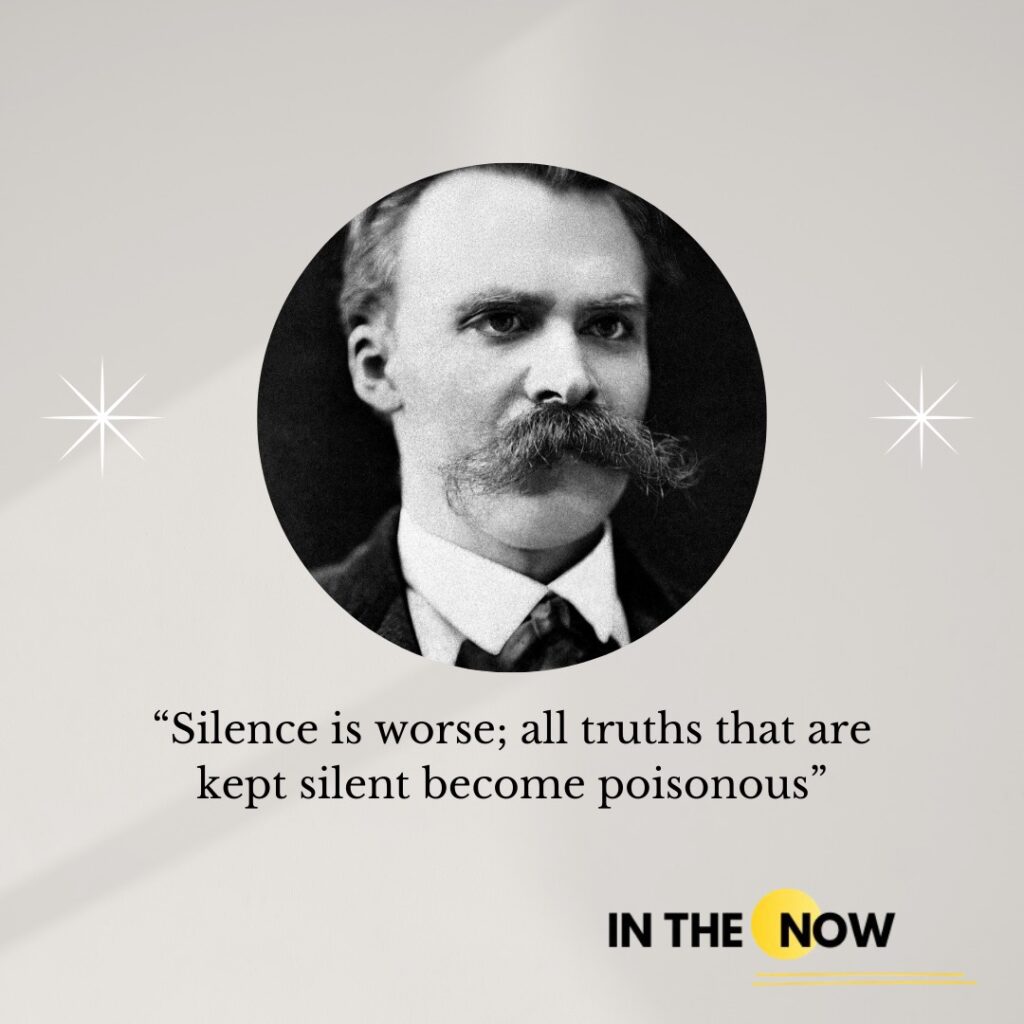
Silence is never the answer to anything that’s happening around you, for it can be destructive. When you ignore the truth or stay silent, they fester beneath the surface and grow twisted and toxic over time. Speak up and confront the truth even if it’s difficult to do so.
Let’s take an example of Nietzsche’s quote and apply it to toxic relationships where one partner hides their resentment or unhappiness. Instead of addressing issues openly, the silence decomposes the relationship. It unspoken truths into bitterness and emotional distance, which can ultimately destroy the relationship from within. This perfectly reflects Nietzsche’s idea: truths that are kept silent become poisonous, but once acknowledged, they can lead to renewal and strength.
10. Become who you are
According to Nietzsche, the genealogy of morality is to be who you are. Stop pretending to be someone you are not. Stop imitating others and reject the false narratives society has been feeding you all along. You are not born as a complete, fully-formed self. You must shape and forge your identity on your own through struggle, choice, and authenticity.
Dig beneath all the layers of fear, societal conditioning, traumas, and weaknesses. Confront them. Recognize that you don’t need to have a fixed identity and break free from the constraints of the expectations of your friends and family members. Embrace this path and you will find an authentic version of yourself. That’s what you need to become.
11. My formula for greatness in a human being is amor fati: that one wants nothing to be different, not forward, not backward, not in all eternity
Amor fati, a Latin phrase for “love of fate,” is another theory popularized by Nietzsche, whose views on life and greatness revolve around this acceptance of everything that happens to us. It’s about accepting the good, the bad, and the ugly.
In a world where we often try to change or escape suffering, loss, or mistakes, Nietzsche proposes a revolutionary alternative. He wants us to love our fate, to want nothing in our life to be different, whether in the past, present, or future. When we do so, we will align ourselves with life’s fullest potential and we will find meaning in every experience, including the painful ones.
12. There is more wisdom in your body than in your deepest philosophy
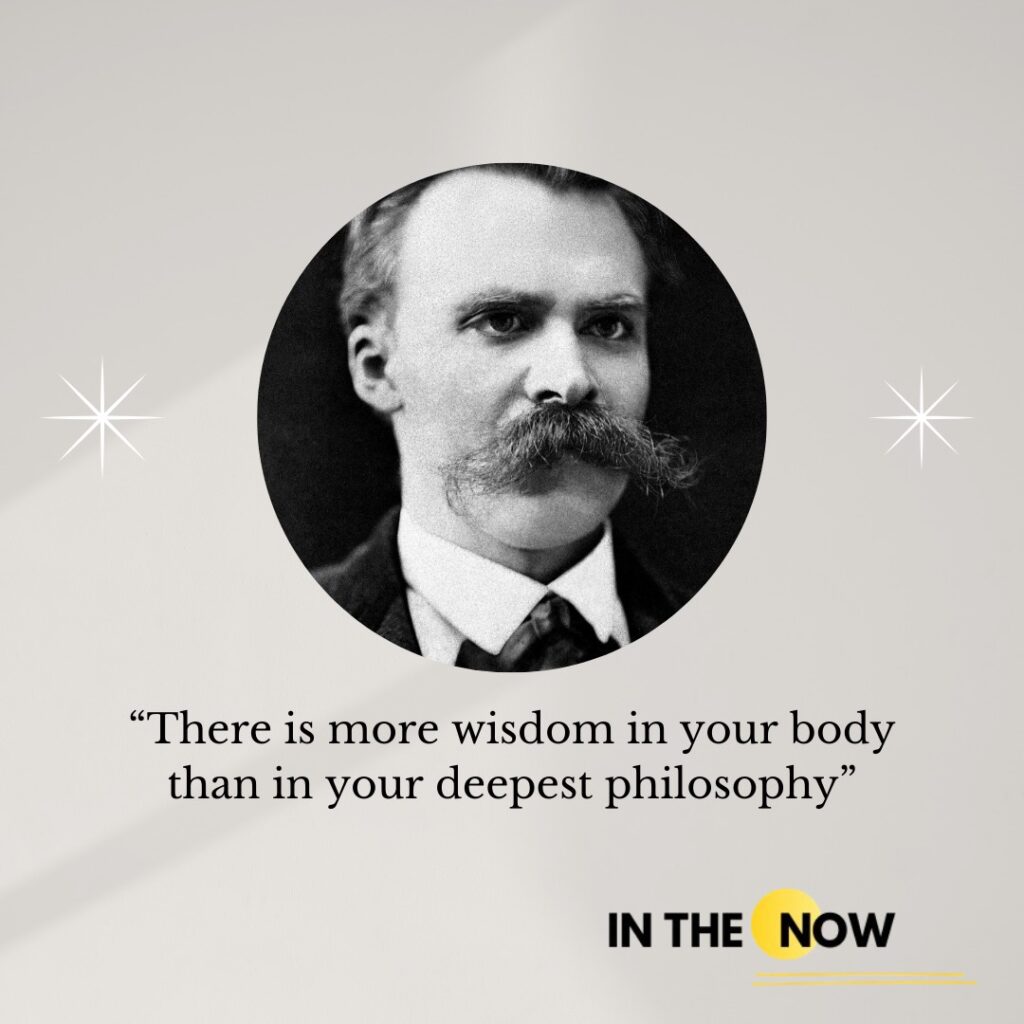
Your body knows what’s better for you than your mind. Sometimes we rely on logic, rules, and big theories to guide our lives, and overthinking everything can make us anxious.
On the other hand, your body has natural instincts. It knows when something feels right or wrong, when you are tired, excited, scared, or in love.
I have personally experienced this when I ignored my gut feeling and tried to overanalyze situations, which I only ended up regretting later because I didn’t trust what I felt in that moment.
Recently, I hesitated to take a new job; my body felt a sense of unease that I couldn’t shake, but I ignored it in favor of logic. My brain kept telling me I couldn’t do it because I already have a lot on my plate. I ignored my brain and listened to my body, and took the job. I am happier than ever.
13. He who cannot obey himself will be commanded
If you don’t have the discipline and strength to follow your own values and goals, someone else will control your life for you. If you cannot build a life where you value your worth, respect yourself, and become courageous, then you’ll end up living your life by someone else’s rules.
Nietzsche encouraged self-mastery, and he believed that true freedom doesn’t come from doing whatever you want, but from having the power to direct yourself, to live with purpose, and to be your own guide.
How Are Nietzsche’s Sayings Relevant Today?
Why does Nietzsche’s philosophy of life matter today? In a world that is shaped by distraction, conformity, and curated perfection, his call to understand ourselves and embrace life without being fake feels more vital than ever.
The teachings of Nietzsche on life, love, rejection, struggle, hardships, and being authentic mattered then, and they matter now, because we are still afraid of pain, still seduced by the uncertainty of life, still tempted to look outward for worth when the only real transformation begins within.
Hence, these life lessons from Nietzsche about not giving up are relevant even today when met with calamities. His sayings urge us to live deliberately, courageously, and consciously, even when life feels uncertain. These are not just lessons, they are thresholds of life.
Conclusion
Start reading Nietzsche’s quotes and books if you feel stuck in your life. His words and rules for life won’t be comforting, but they’ll make you look at life from a different perspective. In the face of suffering, he wants us to grow. During adversities, he wants us to be brave. In times of oppression, speak the truth. Do not stay silent. Life lessons learned the hard way from Nietzsche do not tell you who to be; they ask if you are willing to find out.
FAQs
According to Nietzsche, finding yourself requires shaping your identity by overcoming challenges, showing growth when you are suffering, and practicing integrity even when others are creating chaos in your life.
Nietzsche saw life as inherently chaotic, uncertain, and often painful. He believed life’s value doesn’t come from comfort or morality. It comes when you embrace struggle, growth, life changes, and honesty.
Nietzsche suffered a mental breakdown (exact mental illness unknown) in 1887. He was first admitted in an asylum, then later was taken care of by his mother and sister. He never recovered from it and died in 1990 due to pneumonia.
Nietzsche did not believe in God, and he often critiqued religious ideologies and beliefs. He saw this as a downfall for humanity and urged humans to create new values and live in a world without any religious or superstitious beliefs.
The Dictionary Of Obscure Sorrows: 30 Words To Describe Emotions You’ve Felt But Couldn’t Describe
13 Ancient Greek Philosophers Who Shaped The World With Their Revolutionary Ideas

